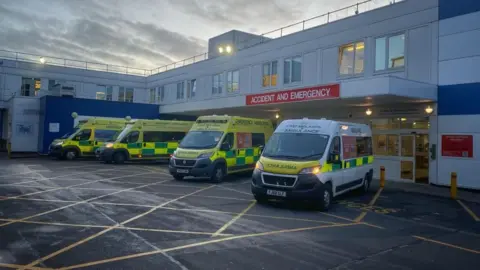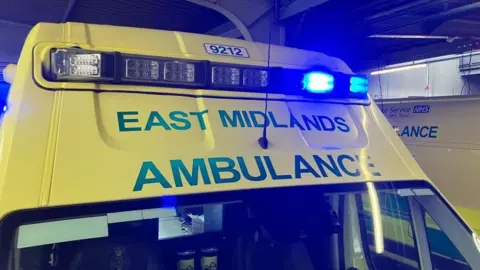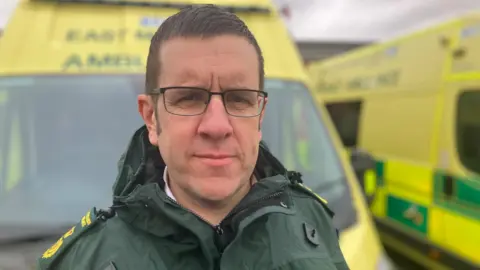Ambulance staff spend 25,000 hours in A&E queues
 Martin Barber/BBC
Martin Barber/BBCStaff at an ambulance service lost 25,000 hours in queues outside hospitals waiting to hand patients over last month.
Papers being presented at January's meeting of East Midlands Ambulance Service (EMAS) said it was the trust's second-worst month ever for handover delays outside accident and emergency departments.
On average, Northamptonshire accounted for the longest of those delays, with ambulances waiting for an average of one hour 25 minutes against a national target of 15 minutes.
The ambulance trust's chief executive said the situation it faced was "not acceptable".
 Rob Sissons/BBC
Rob Sissons/BBCThe only time delays were worse was in December 2022, the first Christmas following the Covid pandemic, when people began socialising after lockdown.
The delays are one of the reasons that EMAS declared its first critical incident, which has now been stood down, since the trust's formation in 1999.
Its director of operations, Ben Holdaway said the situation reflected pressure across the whole system.
"It's not an ambulance issue and it's not a hospital issue," he said.
"What it is about is being able move a patient through the hospital... through the wards and out to social care. If that movement isn't happening, that's where we see the delays.
"It's an awful patient experience; ambulances aren't set up to look after patients for hours and hours on end.
"We have situations where our crews are only seeing one or two patients in a shift."
 Rob Sissons/BBC
Rob Sissons/BBCIn his report to the trust's board, trust chief executive Richard Henderson said there were 402 breaches of minimum care safety standards in November, which was evidence of the impact "on the quality of care".
"I continue to be concerned for the safety of our patients and the welfare of our staff due to hospital handover delays," he said.
Mr Henderson added that the trust had been in regular discussions with NHS England and integrated care boards, who pay for services locally.
"The situation we face is not acceptable and we continuously work to influence improvements," he said.
"I have shared details of our significant patient safety risk with commissioners and asked each NHS system to undertake an urgent review to support rapid release of ambulance crews from hospital."
Mr Henderson said there were some initiatives to try to reduce delays, including the recruitment of paramedics to work in call centres, with the aim of reducing the number of ambulances needing to go to hospital.
Follow Northamptonshire news on BBC Sounds, Facebook, Instagram and X.
